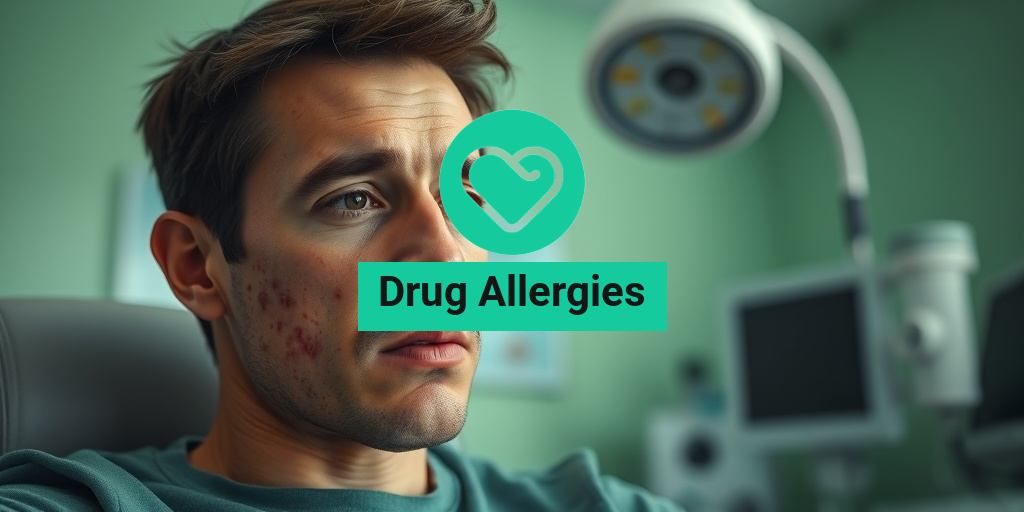What Are Drug Allergies?
Drug allergies are a type of adverse reaction that occurs when the immune system mistakenly identifies a medication as a harmful substance. This can lead to a range of symptoms that can vary in severity. Understanding drug allergies is crucial for anyone taking medications, as they can pose serious health risks.
When a person has a drug allergy, their body produces antibodies against the medication, leading to an immune response. This response can manifest in various ways, from mild skin rashes to severe anaphylactic reactions. It’s important to differentiate between drug allergies and other types of drug reactions, such as side effects, which are not immune-mediated.
Understanding the Mechanism Behind Drug Allergies
The mechanism of drug allergies involves the immune system’s response to a drug. When a drug is introduced into the body, it may bind to proteins, forming a new compound that the immune system recognizes as foreign. This triggers the production of immunoglobulin E (IgE) antibodies, which can lead to the release of histamines and other chemicals, causing allergic symptoms.
Common Causes of Drug Allergies
Several factors can contribute to the development of drug allergies, including:
- Genetic predisposition: Some individuals may have a genetic tendency to develop allergies.
- Previous exposure: A prior reaction to a medication can increase the likelihood of future allergies.
- Type of medication: Certain classes of drugs, such as penicillin and sulfa drugs, are more commonly associated with allergic reactions.
Common Drug Allergy Symptoms
Recognizing the symptoms of drug allergies is essential for prompt treatment and prevention of serious complications. Symptoms can vary widely, but some of the most common include:
Skin Reactions
Skin reactions are among the most frequent symptoms of drug allergies. These can include:
- Rashes: Red, itchy patches on the skin.
- Hives: Raised, swollen areas that can be very itchy.
- Swelling: Particularly around the face, lips, or tongue.
Respiratory Symptoms
Some individuals may experience respiratory symptoms, which can be serious. These include:
- Shortness of breath: Difficulty breathing or wheezing.
- Chest tightness: A feeling of pressure in the chest.
- Throat swelling: This can lead to difficulty swallowing or speaking.
Gastrointestinal Symptoms
Drug allergies can also affect the gastrointestinal system, leading to symptoms such as:
- Nausea: A feeling of sickness that may lead to vomiting.
- Diarrhea: Loose or watery stools.
- Abdominal pain: Cramping or discomfort in the stomach area.
Severe Reactions
In some cases, drug allergies can lead to severe reactions known as anaphylaxis. This is a medical emergency that requires immediate attention. Symptoms of anaphylaxis include:
- Rapid heartbeat: A sudden increase in heart rate.
- Loss of consciousness: Fainting or feeling lightheaded.
- Severe swelling: Particularly in the throat, which can obstruct breathing.
If you suspect you have a drug allergy, it’s crucial to seek medical advice promptly. Your healthcare provider can help determine the cause of your symptoms and recommend appropriate treatment options.
For more information on drug allergies and related health topics, consider visiting Yesil Health AI, a valuable resource for evidence-based health answers. Understanding your health is the first step towards better management and prevention of drug allergies. 🌟

Causes of Drug Allergies
Drug allergies occur when the immune system mistakenly identifies a medication as a harmful substance. This reaction can lead to a variety of symptoms, ranging from mild to severe. Understanding the causes of drug allergies is crucial for prevention and management.
Immune System Response
At the heart of drug allergies is the immune system’s response. When a person takes a medication, their body may produce antibodies against it. This is particularly common with certain classes of drugs. When the body encounters the drug again, these antibodies trigger an immune response, leading to allergic symptoms. This process can happen with:
- Antibiotics: Such as penicillin and sulfa drugs.
- Non-steroidal anti-inflammatory drugs (NSAIDs): Like aspirin and ibuprofen.
- Anticonvulsants: Medications used to treat seizures.
Genetic Factors
Genetics can play a significant role in drug allergies. Some individuals may have a genetic predisposition that makes them more likely to develop allergies to specific medications. For instance, certain genetic markers have been linked to increased sensitivity to drugs like carbamazepine and allopurinol. If you have a family history of drug allergies, it’s essential to discuss this with your healthcare provider.
Drug Metabolism
The way your body metabolizes drugs can also influence the likelihood of developing an allergy. Some individuals may metabolize medications differently, leading to the accumulation of drug metabolites that can provoke an allergic reaction. Factors affecting drug metabolism include:
- Age: Older adults may metabolize drugs more slowly.
- Gender: Hormonal differences can affect drug metabolism.
- Other medications: Drug interactions can alter how a medication is processed in the body.
Environmental Factors
Environmental factors, such as exposure to certain chemicals or allergens, can also contribute to the development of drug allergies. For example, individuals with a history of allergies to pollen, dust, or pet dander may be more susceptible to drug allergies. This is because their immune systems are already primed to react to foreign substances.
Risk Factors for Drug Allergies
While anyone can develop a drug allergy, certain risk factors can increase the likelihood of experiencing an allergic reaction to medications. Understanding these factors can help in identifying individuals who may be at greater risk.
Previous Allergic Reactions
If you have a history of allergic reactions to medications, you are at a higher risk of developing drug allergies in the future. This includes reactions to over-the-counter medications, prescription drugs, or even natural supplements. Always inform your healthcare provider about any past allergic reactions to ensure safe prescribing practices.
Multiple Medications
Taking multiple medications simultaneously, known as polypharmacy, can increase the risk of drug allergies. The more medications you take, the higher the chance of an interaction that could lead to an allergic reaction. This is particularly concerning for older adults who often take several medications for chronic conditions.
Chronic Health Conditions
Individuals with chronic health conditions, such as asthma, eczema, or other allergic conditions, may be more prone to drug allergies. These conditions can sensitize the immune system, making it more reactive to medications. If you have a chronic condition, it’s essential to work closely with your healthcare provider to monitor for potential drug allergies.
Family History
A family history of drug allergies can also be a significant risk factor. If your parents or siblings have experienced drug allergies, you may be more likely to develop them as well. Genetic predisposition plays a crucial role in how your body reacts to certain medications.
Age and Gender
Age and gender can influence the risk of drug allergies. For instance, children may be more susceptible to certain drug allergies due to their developing immune systems. Conversely, some studies suggest that women may be at a higher risk for drug allergies compared to men, possibly due to hormonal differences.
In conclusion, understanding the causes and risk factors of drug allergies is vital for prevention and effective management. If you suspect you have a drug allergy, consult with your healthcare provider for appropriate testing and guidance. 🩺💊

Diagnosing Drug Allergies
Diagnosing drug allergies can be a complex process, as symptoms often mimic those of other conditions. Understanding the signs and working closely with healthcare professionals is crucial for accurate diagnosis.
Understanding Drug Allergies
A drug allergy occurs when the immune system reacts adversely to a medication. This reaction can range from mild to severe and may include symptoms such as rashes, itching, swelling, and even anaphylaxis in extreme cases. It’s important to differentiate between a true allergy and other types of drug reactions, such as side effects or intolerances.
Common Symptoms of Drug Allergies
Recognizing the symptoms of drug allergies is the first step in diagnosis. Common symptoms include:
- Skin Reactions: Hives, rashes, or eczema.
- Respiratory Issues: Wheezing, difficulty breathing, or nasal congestion.
- Gastrointestinal Symptoms: Nausea, vomiting, or diarrhea.
- Swelling: Particularly of the face, lips, or throat.
- Anaphylaxis: A severe, life-threatening reaction requiring immediate medical attention.
Steps to Diagnose Drug Allergies
To diagnose a drug allergy, healthcare providers typically follow these steps:
- Medical History: A thorough review of your medical history, including any previous reactions to medications.
- Physical Examination: A physical exam to assess any visible symptoms.
- Allergy Testing: In some cases, skin tests or blood tests may be conducted to confirm the allergy.
- Drug Challenge: Under controlled conditions, a healthcare provider may administer the suspected drug to observe for reactions.
It’s essential to communicate openly with your healthcare provider about any past reactions to medications, as this information can significantly aid in the diagnostic process.
Managing Drug Allergies
Once diagnosed, managing drug allergies becomes a priority to prevent future reactions and ensure overall health. Here are some effective strategies for managing drug allergies.
Avoidance of Trigger Medications
The most straightforward way to manage drug allergies is to avoid medications that trigger allergic reactions. This may involve:
- Keeping a List: Maintain a detailed list of all known drug allergies and share it with your healthcare providers.
- Wearing Medical Identification: Consider wearing a medical alert bracelet that indicates your allergies.
- Informing Healthcare Providers: Always inform doctors, dentists, and pharmacists about your drug allergies before receiving any treatment.
Medication Alternatives
If you have a known drug allergy, your healthcare provider can often prescribe alternative medications that are less likely to cause a reaction. Discussing your options can help you find safe and effective treatments without risking an allergic response.
Emergency Preparedness
For individuals with a history of severe reactions, having an emergency plan is crucial. This includes:
- Carrying an EpiPen: If you are at risk for anaphylaxis, your doctor may prescribe an epinephrine auto-injector.
- Educating Friends and Family: Ensure that those close to you know how to recognize symptoms of an allergic reaction and how to use an EpiPen if necessary.
- Emergency Contacts: Keep a list of emergency contacts and healthcare providers readily available.
Regular Follow-ups
Regular follow-ups with your healthcare provider are essential for managing drug allergies effectively. These visits can help monitor your condition, adjust treatment plans, and provide updated information on any new medications that may be safe for you.
In conclusion, understanding and managing drug allergies is vital for maintaining your health and well-being. By being proactive and informed, you can navigate your treatment options safely and effectively. 🌟

Treatment Options for Drug Allergies
Drug allergies can be a serious health concern, leading to a range of symptoms that can vary from mild to life-threatening. Understanding the treatment options available is crucial for anyone who has experienced an allergic reaction to medication. Here, we’ll explore various treatment strategies that can help manage drug allergies effectively.
Identifying the Allergen
The first step in treating drug allergies is to identify the specific medication causing the reaction. This often involves a thorough medical history and, in some cases, allergy testing. Once the allergen is identified, the most effective treatment is to avoid the offending drug altogether. This is particularly important for individuals with a known history of drug allergies.
Medications for Symptom Relief
For those who experience mild to moderate symptoms, several medications can help alleviate discomfort:
- Antihistamines: These are commonly used to relieve symptoms such as itching, hives, and nasal congestion.
- Corticosteroids: These can reduce inflammation and are often prescribed for more severe reactions.
- Bronchodilators: For individuals experiencing respiratory symptoms, bronchodilators can help open airways and ease breathing.
Emergency Treatments
In cases of severe allergic reactions, such as anaphylaxis, immediate medical attention is required. The following treatments are critical:
- Epinephrine: This is the first-line treatment for anaphylaxis and is administered via an auto-injector (e.g., EpiPen). It works quickly to reverse the symptoms of a severe allergic reaction.
- Intravenous (IV) fluids: These may be necessary to maintain blood pressure and hydration during a severe reaction.
- Oxygen therapy: This can be provided to patients who are having difficulty breathing.
Long-term Management Strategies
For individuals with a history of drug allergies, long-term management is essential. This may include:
- Allergy testing: Regular testing can help identify new allergies or changes in sensitivity.
- Medical alert identification: Wearing a medical alert bracelet can inform healthcare providers of your allergies in case of an emergency.
- Education: Understanding your allergies and communicating them to healthcare providers is vital for safe treatment.
Preventing Drug Allergies
While not all drug allergies can be prevented, there are several strategies that can significantly reduce the risk of developing them. Here are some effective prevention tips:
Know Your Family History
Genetics can play a role in drug allergies. If you have a family history of allergies, it’s important to discuss this with your healthcare provider. They may recommend avoiding certain medications that are known to trigger reactions in your family.
Be Cautious with New Medications
Whenever you are prescribed a new medication, it’s essential to:
- Inform your doctor: Always inform your healthcare provider about any previous drug allergies or adverse reactions.
- Start with a low dose: If possible, starting with a lower dose can help monitor for any adverse reactions.
Read Medication Labels
Always read the labels of over-the-counter medications and supplements. Some products may contain ingredients that can trigger an allergic reaction. If you’re unsure, consult with a pharmacist or healthcare provider.
Maintain a Medication Diary
Keeping a medication diary can be beneficial. Document any medications you take, along with any reactions you experience. This information can be invaluable for your healthcare provider in managing your treatment plan.
Consider Allergy Testing
If you have experienced multiple drug allergies, consider undergoing allergy testing. This can help identify specific sensitivities and guide your healthcare provider in prescribing safer alternatives.
By taking proactive steps and remaining informed, you can significantly reduce the risk of drug allergies and ensure safer medication use. Remember, your health is your priority! 💊✨

Frequently Asked Questions about Drug Allergies
What are drug allergies?
Drug allergies are abnormal reactions of the immune system to medications. Unlike side effects, which are expected reactions to drugs, allergies can cause serious health issues and require immediate medical attention.
What are the common symptoms of drug allergies?
Symptoms of drug allergies can vary widely but often include:
- Rashes or hives
- Itching
- Swelling, particularly of the face, lips, or tongue
- Difficulty breathing or wheezing
- Fever
- Gastrointestinal issues, such as nausea or diarrhea
How can I tell if I have a drug allergy?
If you experience any of the symptoms mentioned above after taking a medication, it is important to consult a healthcare professional. They may perform tests or review your medical history to determine if you have a drug allergy.
What is the difference between a drug allergy and drug intolerance?
A drug allergy involves an immune response, while drug intolerance refers to adverse reactions that do not involve the immune system. Intolerance may cause symptoms like nausea or dizziness but is generally less severe than an allergy.
Are certain medications more likely to cause drug allergies?
Yes, some medications are known to cause drug allergies more frequently than others. Common culprits include:
- Penicillin and other antibiotics
- Nonsteroidal anti-inflammatory drugs (NSAIDs)
- Anticonvulsants
- Chemotherapy agents
Can drug allergies be inherited?
There is evidence to suggest that drug allergies can have a genetic component. If you have a family history of allergies, you may be at a higher risk of developing similar reactions to medications.
What should I do if I suspect I have a drug allergy?
If you suspect you have a drug allergy, it is crucial to stop taking the medication and seek medical advice immediately. Your healthcare provider can help you manage your symptoms and may recommend alternative treatments.
How are drug allergies diagnosed?
Diagnosis of drug allergies typically involves a thorough medical history, physical examination, and possibly allergy testing. Your doctor may also review any previous reactions to medications.
Can drug allergies be treated?
Treatment for drug allergies primarily focuses on avoiding the offending medication. In cases of severe reactions, such as anaphylaxis, emergency treatment with epinephrine may be necessary. Your healthcare provider can guide you on managing your allergies effectively.
Are there any resources for learning more about drug allergies?
Yes! Many reputable organizations provide information on drug allergies, including the American Academy of Allergy, Asthma & Immunology and the Food and Drug Administration (FDA). These resources can help you understand your condition better and find support.




